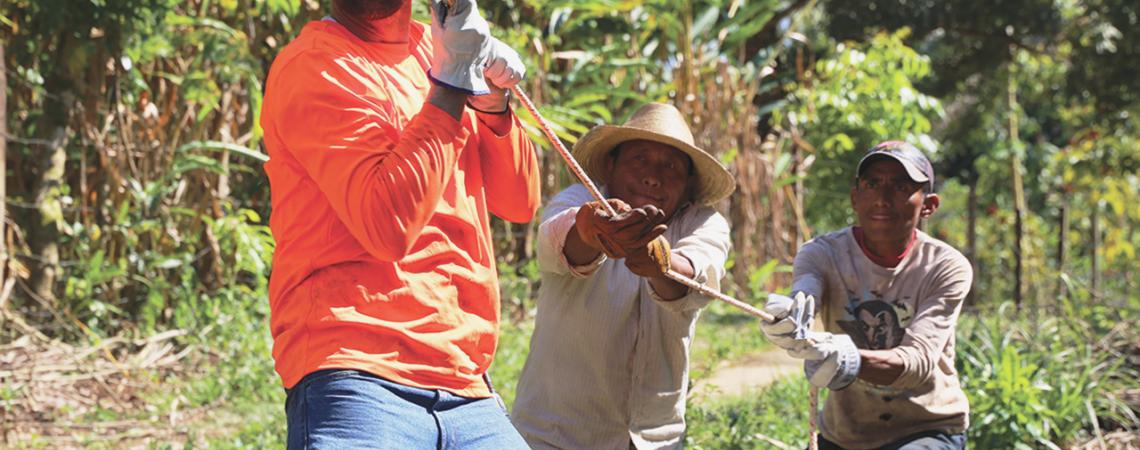Jobs ranged from setting poles and installing distribution line, to placing switches and bulbs in the homes. The group also delivered shoes, computer equipment, and water purification systems to the villagers, who were friendly and hospitable. (Photo by Brian E. Barr)
In a way, the scene was reminiscent of 1930s and ’40s rural America: two out-of-the-way villages getting electricity for the first time. This past March, however, the setting was a remote area of Central America, where a team of 17 linemen from Ohio electric cooperatives traveled to the villages of Las Tortugas and San Jorge, in northern Guatemala, on a humanitarian mission to supply electricity for the first time to the small villages.
The linemen, who hailed from 11 of Ohio’s co-ops, worked through sweltering heat on a 17-day journey to build lines, hang transformers, and wire homes for service alongside linemen from Empressa Municipal Rural de Electricidad (EMRE), the local electric distribution company, and several students from a local electrical trade school. About 20 men from the villages also assisted nearly every day.
“The scope of the project was large and the adversity our guys faced on the project was unbelievable, but they overcame the odds and got it done,” says Dwight Miller, director of safety and loss control at Ohio’s Electric Cooperatives, the statewide association that provides services to the 25 electric cooperatives in the state. Miller was the on-site manager of the project. “The team was simply amazing. Seeing the lights come on in those two villages allowed us to experience the same thing our co-ops felt when they turned lights on in the 1930s and 1940s in rural America. It was incredible to witness.”
At the end of the project, 142 homes and businesses lit up for the first time in an emotional ceremony that was followed by celebratory fireworks.
“These villagers have almost nothing, yet they’re so thankful for what little they do have,” Miller says. “They’ve desired electricity for many years, so to be able to have such an impact on these 900 lives, as well as future generations, by offering such a small fraction of the things we’ve been so blessed with is humbling.”
Donations totaling more than $20,000, mostly from co-op employees and trustees from around Ohio, were used to stimulate a better quality of life — contributions paid for water filtration systems for homes where electricity was installed, so residents will no longer have to boil water before consuming it; provided shoes for nearly 500 children in the villages; and bought laptop computers, projectors, printers, and other supplies for two schools. Most of the purchases were made in nearby Ixcan in an effort to make an even more positive impact on the local economy.
Over the last 50 years, programs designed by NRECA International have provided more than 126 million people in 43 countries with access to safe, affordable, and reliable electricity. Still, the International Energy Agency says more than 3 billion people lack proper access to electricity. The work continues.









